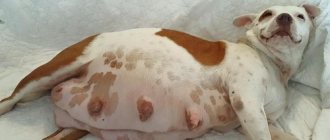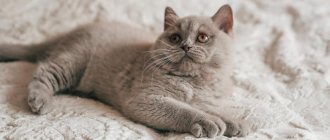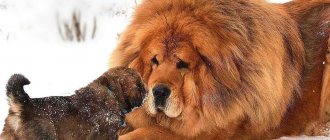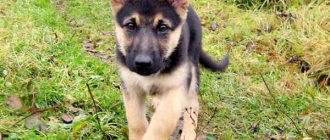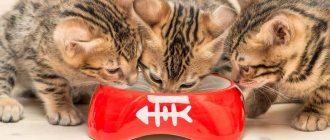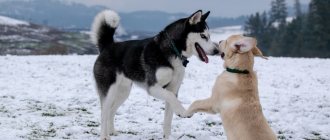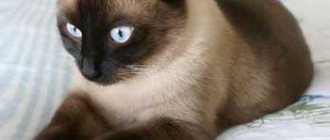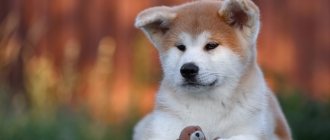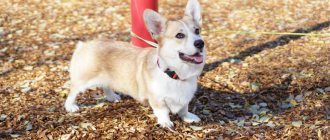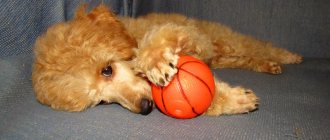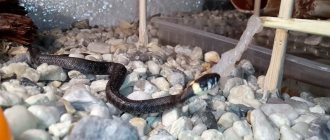The health and full life of ferrets depends entirely on proper feeding. If the diet is incorrect, this becomes the cause of various diseases and the pet’s life expectancy is significantly reduced.
Although the ferret belongs to the category of domestic animals, it cannot be compared with a cat and a dog. There are situations when ferret owners give their pets dog or cat food. This is strictly prohibited! The structure of the ferret's body is not at all similar to cats or dogs, its behavior is noticeably more active. All of this greatly affects your ferret's metabolism and metabolism. This is an animal with its own needs and needs to be fed only with special food.
The ferret has predator teeth that are designed to crush bones and tear off pieces of meat. These animals are by nature hunters of insects, birds and various rodents.
Diet for domestic ferrets
At home, ferrets must be fed food whose composition is as close as possible to the diet in their natural habitat. The owner can choose to feed natural products or ready-made food containing a complex of vitamins and minerals necessary for the normal growth and development of the pet.
Recommended daily diet for a domestic ferret:
- animal protein – 30-35%;
- fats – 20-22%;
- carbohydrates – no more than 20%;
- vegetable fiber – 2-3%.
List of recommended products
Now you need to figure out which products contain the above components and what you can give your ferret at home.
What can you feed your pet ferret:
- poultry meat;
- boiled lamb;
- lean beef;
- rabbit meat;
- horsemeat;
- poultry by-products;
- sea and red fish;
- seafood (shrimp, squid);
- eggs (quail, chicken);
- multi-grain porridge.
What not to feed ferrets
It is not advisable to give ferrets vegetables, especially raw and hard pieces. Their body is not adapted to digest plant foods. In addition, this product has no nutritional value for these animals.
What else should not be given to ferrets:
- baked goods;
- nuts;
- citrus;
- chocolate, ice cream and sweet desserts containing sugar;
- salty foods;
- smoked meats;
- fried and fatty meat;
- hot seasonings and spices;
- garlic;
- soy products;
- I eat from my table;
- Food for dogs and cats.
Treats and vitamins
You can pamper your furry friend with raisins, dates, pieces of cheese, banana, and low-fat cottage cheese. Such products are served no more than 1-2 times a week in small quantities.
What do ferrets eat in the wild?
Live food is the healthiest option for any predator
Ferrets are predators, so they get their food by hunting other animals, birds and catching fish . Hunting mainly occurs at night, since the animal sleeps during the day. However, if the ferret is very hungry, it can go out in search of food even during daylight hours.
The most common prey items are:
- Small rodents (voles, gophers, moles);
- Reptiles and amphibians (frogs, lizards);
- Little birds and eggs;
- Insects and worms;
- Fruits and fish. They occupy a tiny part of the diet of wild ferrets. Their digestive organs are not adapted to digest plant foods, therefore, to obtain all the necessary substances, ferrets only need the remains of plant fibers in the stomachs of the herbivores on which they feed.
There are cases where ferrets feed on carrion in the wild. This happens if the predator for some reason cannot hunt or remains hungry for a long time.
Diet based on natural products
Domestic ferrets should not be fed food from your table. Food for them is prepared separately, without salt and spices.
Main menu:
- 2/3 of the daily diet is meat.
- 1/3 of the diet is cereal porridge. You can prepare a dish by combining oatmeal, buckwheat, wheat and rice.
It is very convenient and healthy to feed domestic ferrets with “minced meat”, which involves mixing cereals with parts of minced meat and offal in a ratio of 1:3. It can be prepared in advance, divided into portions and placed in the freezer. Before feeding, food is defrosted to room temperature.
If desired, the owner can add small quantities of vegetables to the cereal porridge (no more than 10% of the total portion).
Boiled eggs are served to your pet no more than 2-3 times a week.
How many grams of natural food do ferrets eat per day?
What not to feed your ferret
Sausages and processed foods are harmful to both ferrets and other animals
It is important to pay attention to products that are strictly prohibited, as they cause serious harm to the health of pets.
List of prohibited products:
- Fatty meat (lamb, pork);
- Fried and smoked meat;
- Sausages and semi-finished meat products;
- Most types of fish, except those allowed (various types of red fish, mackerel, herring, cod and horse mackerel are allowed);
- Milk and sour cream;
- Potato;
- Citrus;
- Mushrooms;
- Nuts;
- Onion and garlic;
- Spices, herbs and spices;
- Spicy;
- Salty;
- Sweet.
Separately, it is necessary to highlight the categorical ban on food from the common table and food for other animals (except for food for kittens).
Dry food diet
A simplified method of feeding ferrets at home involves the use of dry food created specifically for these animals. It contains all the necessary substances in the correct ratio.
Dry food is divided into three segments:
- budget category - economy;
- premium;
- super premium.
The food is selected individually. After the first days of feeding, the owner needs to monitor the condition of the animal. If the chosen food is suitable, the ferret will be active, stool will normalize, coat color will improve, and there will be no dandruff or other negative signs.
If any adverse symptoms are detected, the food should be changed. The assortment includes a large selection of products from different manufacturers, so there will be no problems with the choice.
The only advice from veterinarians is not to buy cheap food of questionable quality for your pet ferrets. This product contains a meager composition of useful elements. Poor quality food can cause disturbances in the functioning of the digestive system and provoke the development of intractable diseases.
Our website offers a large selection of healthy food for ferrets from the world's best manufacturers. Premium and Super Premium dry food with vitamin and mineral complexes for healthy growth and development of domestic ferrets is always available.
Features of nutrition during pregnancy, growth and molting
During the period of growth, molting and pregnancy, animals need to be fed more often and more. This is due to the natural need of the body, which requires an increased amount of nutrients. Priority is given to foods high in calcium, iron, phosphorus and B vitamins.
In addition to increasing daily portions, your ferret can be fed fish oil, which is especially beneficial for growing ferrets and females.
Treats
Sometimes pets can be given treats at home, but they should eat them in limited quantities. Many owners of these animals often ask the question: can a ferret have a watermelon? This berry can be given to these animals, but as a reward and not too often. The following foods can also be given as treats;
- melon;
- pears;
- banana pieces;
- yoghurts;
- raisin;
- small hard pieces;
- oatmeal cookies;
- yoghurt sweets.
But whether a ferret can have milk is a controversial issue. But still, you should not give them this product. It is better to replace it with kefir, fermented baked milk, and yogurt.
Many treats for these animals can be purchased at pet stores. Moreover, these places provide a wide range of goodies that do not have a harmful effect on these animals.
But before giving these products, it is worth remembering that they are best used as a reward and in limited quantities. Still, the main part of the diet should consist of meat feed mixtures with a balanced composition. It is through these feeds that the full development of ferrets is ensured, and their vital energy is also maintained.
We create comfortable conditions for eating
Small ferrets should always have fresh water freely available. It must be changed at least once a day. Most of all, pets like to drink from regular bowls, although the cubs can accidentally knock them over or dirty them.
Ferrets love to dig and “extract” their food from the container, scattering it throughout the cage. The best way to prevent this is to use a deep cup or plastic plate mounted high enough on the side of the cage to make it inconvenient for the ferret to dig into it. If you have several pets, it is better to provide a dish for each.
Photo source:
Method 3: Farshekasha
This food option has also found its consumers, but it is difficult to prepare
There are many recipes for farshekashi; it is important that all the necessary vitamins and microelements are present in the ferret’s diet
Recipe
Required ingredients:
- Rolled flour - 40 gr.
- Buckwheat flour - 25 gr.
- Corn or wheat flour - 30 gr.
- Rice flour - 30 gr.
- Turkey or rabbit meat (chilled) - 220 gr.
- Chicken heart - 140 gr.
- Beef heart - 270 gr.
- Beef liver - 120 gr.
- Veal or beef pulp - 200 gr.
- White and dark turkey meat in equal quantities - 260 g.
- Chicken ham or thigh without skin - 400 gr. (minus bones)
- Chicken fillet - 500 gr.
- Water - 250 ml.
- Low-fat cottage cheese (0.1-0.5%) - 250 gr.
- Chicken skin - 55 gr.
- Chicken fat - 20 gr.
- Cleaned chicken gizzards - 250 gr.
- Chicken head and neck - 1200 gr.
Cooking method:
Ready-made food for ferrets
If the level of employment is high and it is impossible to independently prepare the necessary feed mixture, you can go to any pet store and purchase ready-made food, but which one is best for your ferret is something you have to figure out. It can be economy or premium, dry or wet.
Dry food
The best dry foods for ferrets are in the super premium category. This mark means that it contains no preservatives, only natural products are used, and the composition contains the maximum amount of products containing animal protein.
In addition to super premium, you can find premium and economy food. It is advisable to purchase the latter in rare cases. If it is impossible to buy expensive balanced feeds, it is better to prepare the mixture yourself.
There are general recommendations for feeding your ferret dry food:
- Of all the ingredients, the largest volume should be poultry, cattle or cold cuts.
- Plant fibers can be no more than 5%.
- Corn is a nutritional component, but it should not be in the feed. A low percentage of corn flour content is acceptable, but if corn is included as the main component, the animal should not eat such feed.
- The composition must contain additives - amino acids, vitamins, mineral components.
- It is necessary to pay attention to the percentage of ash content, since exceeding the norm can cause urolithiasis. The permissible limit is up to 7%.
The most popular feeds are:
- Bosch Tiernahrung GmbH & Co Bosch, Germany. The line includes dry mixtures for puppies, ferrets over 1 year old, and for older animals over 5 years old. The composition is balanced, and the food itself belongs to the premium and super-premium class. Bosch Totally Ferret Active High Premium contains 36% protein from poultry, 22% fat and only 1.5% fiber.
- Frettchen4you, Germany. The manufacturer offers super premium food with a high protein content. The composition is completely balanced. Frettchen4You Revolution food is hypoallergenic and contains up to 48% protein. The main source of nutrients is assorted fresh turkey meat (from 21%), duck (from 6%), fish (from 6%), rabbit (from 5%), as well as powder mixtures. Under the Frettchen4you brand you can purchase high-protein food with minimal carbohydrate content, as well as complete feed mixtures for every day.
- Padovan Ferret Food, Italy. Despite imported production, this food is one of the least preferred, but widespread due to its low price. Its disadvantage is the presence of cereals, oils, and fats. Plant foods, offal, and a low percentage of meat are used as a source of protein.
Excess fats and carbohydrates in food can lead to a number of diseases in your pet - gastritis, pancreatitis, insulinoma, hypovitaminosis and many others.
High-quality feed completely covers the animal’s need for vitamins, minerals, proteins, fats, carbohydrates, and has a positive effect on development and the immune system.
Wet food
Wet foods are ideal for your ferret's delicate digestive system. They are quickly absorbed and promote better intestinal motility.
The most popular canned foods include:
- Vitakraft FERRET Menu. It contains meat, meat by-products (15%), fish and fish by-products (10%), minerals (10%). Crude fiber contains only 0.2%, and ash - 2%. This food will definitely not cause any difficulties with digestion and is optimal for ferrets of any age.
- Four-legged gourmet Golden line - wet food for ferrets is a super premium food, and the quality of the ingredients is included in the Human grade category, that is, suitable for humans. The main composition is chicken meat, beef, chicken fat, jelly, rice, taurine, brewer's yeast, fish oil, seaweed, water. The food is perfectly balanced and healthy.
- Night hunter, assorted. This food can be given on rare occasions. It contains little meat (from 10%), and the bulk consists of cereals and offal. Such canned food does not contain enough protein for the ferret, and such agile predators need meat.
If you have run out of ferret food at home, but have a cat, you can feed the ferret cat food, but provided that this food is premium or super premium. Cheap cat food is low in meat and high in fiber, but cats and ferrets have very different digestive systems, so what's good for a cat isn't good for a ferret. The best option is to look through the list of products from which you can prepare food for your ferret yourself, make a nutritional mixture and give it to your pet in portions.
Consequences of improper feeding
Ill-thought-out organization of ferret nutrition can turn into a disaster for the owner and the furo itself. Signs that the selected food is not suitable include:
- stomach upset;
- changes in the color and consistency of feces and urine;
- hair loss;
- lethargy of the pet.
If you notice at least one of the above signs, you should immediately seek help from a veterinarian, otherwise the consequences will not be long in coming. If improper feeding continues, the animal will develop diabetes, gastrointestinal diseases and other pathologies.
What food is not recommended?
Not only food for kittens and cats requires careful attention, but also specialized products for ferrets. There are brands that produce food that does not meet the nutritional requirements of ferrets, and some do not consider it necessary to indicate the detailed composition of the product.
Untrustworthy ferret foods:
- Fiory “Superpremium Furby” ferret food. The manufacturer notes that the product contains taurine and is enriched with vitamins A, D3, E. However, the packaging does not indicate what kind of meat was used in the manufacture of the product. This kibble contains too many grains. Lots of negative reviews.
- Vitakraft "Premium Menu" Ferrets - food for ferrets made from meat and animal by-products. Poultry keeping - 24.4%. It contains a lot of grains - in 2nd place in terms of quantity.
- Padovan Ferret Food - food for ferrets. No data on carbohydrates. The specific type of raw material is not specified. The percentage composition seems acceptable, but the ingredients are of questionable quality - meat by-products. Under their guise, any low-quality raw material can be added to the feed.
It is strictly forbidden to give ferrets:
- Dog food - Pedigree, Chappi and the like.
- Soft food for cats - Kitekat, Whiskas, Friskies, Felix, Purina One. Their ash content is too high - 8%. And the maximum permissible value is 6.5-7%. These feeds also contain a lot of corn (17%) and wheat (12%). Almost a third of the composition is grains, this is unacceptable in relation to food for ferrets.
- Rowal Canin – food for cats and kittens. They are based on an isolate of plant rather than animal proteins. These are low-nutrient foods with low protein content.
Ferret and his purchase
To the question of how much a ferret costs, the answer is not entirely clear.
It should be noted that the cost of a ferret can be very different based on a number of factors. First of all, this parameter directly depends on the animal itself and the place where you purchase it. You need to understand that the case here is similar to the situation with purebred cats for exhibitions and ordinary yard cats. Ferrets come in different varieties; first of all, they are distinguished into those that are bred specifically on farms, for home keeping, and also for various exhibitions. With all this, the cost of these types differs greatly from each other, as do the ferrets themselves. It may be noted that refusenik ferrets, which are not intended for breeding, can be purchased even for up to 5,000 rubles. However, is it worth it? Most likely, you will have to pay this amount for an animal at a poultry market, where there may be only one cage for several individuals. There are many resellers there who do not really know the specifics of keeping and raising animals. You may find an ill-mannered and aggressive ferret, and the purchase itself will only bring negative emotions. You can easily get a good ferret for your home at a pet store for 8-12 thousand rubles. In this case, the cost may depend on breeding characteristics, as well as minor deviations from the norm. However, by the capital’s standards, an animal worth more than 12 thousand is considered a worthy acquisition.
Another thing is ferrets with good pedigrees, purchased not from a pet store, but from special breeders who specialize specifically in raising and raising this predator. The cost of such animals can reach 30 thousand rubles and even more. By the way, it is better to purchase animals close to your region, because heavy travel can negatively affect the health of the little one. It is better to contact clubs or private farmers, where you can come and look at the babies yourself. The selection process is similar to the same procedure as when choosing a puppy. The topic is worthy of a separate article.
Mistakes that inexperienced owners make
Before we talk about the rules of feeding a ferret, it is worth talking about the two most common mistakes that the owners of these animals make.
Some of them believe that a ferret is a rodent, that is, they draw analogies with hamsters and guinea pigs, so they try to feed it with appropriate foods. But in fact, there is nothing in common between these animals, because the ferret is a predator, it belongs to the mustelidae family. In the wild, it feeds on small rodents and birds.
Another serious mistake is to feed your ferret like a cat or dog, usually this concerns not only the choice of food, but also the number of meals. Such care will lead to exhaustion of the animal and problems with the digestive system. If you get a ferret, remember that he needs to eat 7 small meals a day, as he has a high metabolic rate.
Getting ready for a little ferret
Let's say you decide to start breeding ferrets and raise babies yourself. Here's what you need to know.
1. A female ferret needs more sleep and food during pregnancy, which lasts about 42 days. Two weeks before giving birth, the pet should be moved to a dark, secluded nest with fresh paper bedding or pine shavings. You must ensure that the animal is never left hungry or vulnerable.
2. After the birth of small ferrets, it is necessary to unobtrusively monitor the nursing female and constantly give her dense, high-calorie food, as well as plenty of water.
3. The cubs feed on milk for about 6 weeks. Then they can be gradually transferred to “adult” food.
Features of feeding in different periods
The diet of ferrets becomes special at certain periods of life. What remains common is the obligatory presence of minerals and vitamins.
Growth period
During breastfeeding, young ferrets receive the nutrients their bodies need through their mother's milk. Deprived of mother's milk, ferrets' gastrointestinal tract becomes vulnerable to infections, which is why probiotics should be kept in the breeder's medicine cabinet at all times.
Ferrets are transferred to “adult” feeding 3-4 weeks after birth. At this time, their baby teeth begin to erupt. In order for babies to quickly get used to this diet, liquid minced meat is introduced into the diet, and low-fat cream or baby kefir is added to the mother’s menu.
Don’t forget about vitamins - 3-4 drops of fish oil are dripped onto the tongue of ferrets. If more male furos were born in the litter, more calcium and phosphorus are added to the food, since males are more active.
Don't forget to give your pets vitamin pastes and supplements. Lack of nutrients negatively affects the growth and further development of ferrets.
Shedding period
Furo molt in early spring and autumn, with the exception of pregnant females who shed on the 20th day of pregnancy, and animals that have suffered a hormonal imbalance. Shedding lasts 1-2 weeks and is accompanied by severe itching. In some areas of the body there is practically no hair.
Ferrets are very clean, so they carefully lick themselves, as a result of which a lot of hair gets into the gastrointestinal tract and vomiting begins. To prevent this from happening, the animals are given fur-removing pastes. Pets are helped to cope with shedding by combing their fur with a brush or using a furminator.
During molting, ferrets need vitamin complexes containing sulfur, brewer's yeast and B vitamins. Thanks to which the new fur will be thick and shiny.
Pregnancy period
In order for the offspring to be born healthy, a pregnant female is given an individual diet.
The menu of a pregnant female must contain:
- phosphorus, calcium for strong teeth and bones;
- vitamins A, E, D and group B - in increased quantities.
When feeding chorihi with natural food, the menu includes meat and bone meal, calcined cottage cheese, and fish oil. If the female eats dry snacks, she is given special food for pregnant women or a product intended for cats. You can’t overfeed a choriha – this leads to obesity, but limiting the female’s nutrition is also dangerous.
Before childbirth and in the first days after it, the chorikha's appetite worsens. The ferret's menu during lactation is identical to the diet during pregnancy. Nutrient requirements are still high.
Vitamins and supplements
As already noted, vitamins and supplements should only be included in a ferret’s diet if the animal is on a home-cooked diet.
An overdose of any vitamin or microelement can harm your pet's health.
The choice of supplements and vitamin complexes for domesticated predators today is quite extensive. Here are the most popular ones:
- "Vita-Sol";
This comprehensive vitamin supplement contains 7 vitamins and 4 types of fatty amino acids. The manufacturer recommends using the supplement during periods of growing up, pregnancy and lactation, as well as during molting of the animal. Directions for use and doses are indicated on the packaging. The duration of the course is 1 month.
- "FerretVite";
FerretVite paste will help your pet gain weight and improve appetite.
This is a special balanced paste that contains minerals, vitamins and easily digestible fats. This product is designed to support ferrets during postoperative periods, and also helps sick and exhausted animals recover.
Eating paste increases the animal's appetite and weight gain, so it is not recommended to give treats to overweight pets. The feeding schedule is indicated on the packaging.
Ferrets are strictly prohibited from taking vitamins intended for humans. Taking such drugs causes illness and death in pets.
- Vitamins of groups A, D and E.
Vitamins of these groups are given mainly to females during periods of estrus, pregnancy and lactation, as well as one-month-old ferrets in order to prevent bone diseases. The dosage should be observed very strictly, adhering to the factory instructions or the veterinarian's prescriptions.
What are the best treats to give your pet?
The shelves of supermarkets and pet stores offer a wide variety of dietary supplements that you can use to please your pet. Most often, such additives consist of cartilage or tendons of various fractions. Ferrets are also treated to cat treats, but before doing so, they will carefully examine them. If your ferret or cat treat contains:
- Sugar.
- Legumes.
- Cereals.
- Sweeteners and preservatives.
- Fruits.
It is better to leave such supplements lying on the shelf - they are not useful for the pet. If the product contains meat, then you can safely take it for your animal, he will appreciate it. In stores for ferrets there are specialized pastes that are both treats and auxiliary vitamin elements.
The paste contains the necessary daily intake of vitamins that are beneficial to the animal. But you don’t have to spend money in stores buying expensive supplements. You can find your ferret's favorite treats by opening the refrigerator.
Meat
By nature, ferrets are carnivores and the majority of their diet consists of meat. Please your pet with tasty additions to the main diet:
- He will definitely like lamb meat in combination with beef, boiled or raw.
- Offal. Naturally, we are not talking about chicken or turkey giblets. But your pet will really like chicken hearts or liver.
- Boiled turkey.
All these delicacies are easy to prepare, but the main thing is to cut the meat into small pieces. Please note that you should not give pork to your ferret.
What not to give to ferrets
Although these furry cunning creatures are very greedy for all sorts of goodies, there are foods that they should not eat even occasionally. These are, for example, butter buns , which the ferret will never refuse, but they can cause bloating and diarrhea.
You cannot feed your ferret regular cat food . Consumption of cheap food can lead to the development of a whole bunch of chronic diseases in a ferret. The same goes for dog food . It is not at all suitable for ferrets.
Attention!
To the question “Can I feed a ferret cat food?” experts unanimously answer: “No! It's harmful to your pets."
It is highly undesirable to base your ferret’s diet on the principle of a common table. Human food is not always suitable for animals. For example, dairy products cause intestinal upset in ferrets, and citrus fruits increase stomach acidity.
Milk should not be given to ferrets!
It is also strictly forbidden to give ferrets:
- nuts
- ice cream
- chocolate
- soda
- smoked and salted products.
Water in the diet
Ferrets often drink liquids, especially if they are fed dry snacks. With this diet, the number of approaches to the drinking bowl reaches 7-12 times. It is important to keep water bowls clean, and the water itself should be fresh, at room temperature. Filtered water is best for drinking and is changed at least 2 times a day.
Ferrets should always have water, because it not only promotes thermoregulation, but also saves the animal from sunstroke in the summer.
Eating in the natural habitat
As a rule, wild ferrets choose burrows as a place to live. Because it is there that they can store food for themselves in sufficient quantities.
Ferrets' favorite foods are meat and eggs. Animals can easily get into the chicken coop and steal the bird from there. Even if a person has made every effort to protect his barn from ferrets, the small animals will still get creative and find a way to get to the food.
Sometimes ferrets eat worms, spiders, various beetles, caterpillars and even wounded animals. With their help, the body is saturated with protein.
